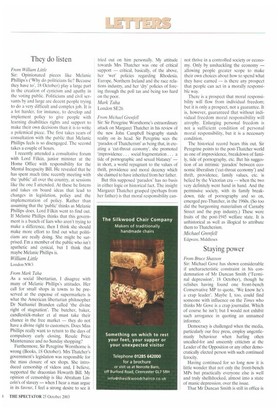From Michael Grenfell
Sir: Sir Peregrine Worsthorne's extraordinary attack on Margaret Thatcher in his review of the new John Campbell biography stands reality on its head. Sir Peregrine sees the 'paradox of Thatcherism' as being that, in creating a 'cut-throat economy', she promoted 'improvidence.., social fragmentation ... a tide of pornographic and sexual blatancy' — in short, a world repugnant to the values of thrift, providence and moral decency which she claimed to have inherited from her father.
But this supposed 'paradox' has no basis in either logic or historical fact. The insight Margaret Thatcher grasped (perhaps from her father) is that moral responsibility can
not thrive in a controlled society or economy. Only by unshackling the economy — allowing people greater scope to make their own choices about how to spend what they have earned — is there any prospect that people can act in a morally responsible way.
There is a prospect that moral responsibility will flow from individual freedom; but it is only a prospect, not a guarantee. It is, however, guaranteed that without individual freedom moral responsibility will atrophy. Enlarging personal freedom is not a sufficient condition of personal moral responsibility, but it is a necessary condition.
The historical record bears this out. Sir Peregrine points to the post-Thatcher world as one of improvidence, breakdown of family, tide of pornography, etc. But his suggestion of an intrinsic 'paradox' between economic liberalism ('cut-throat economy') and thrift, providence, family values, etc. is belied by the Victorian era — when the two very definitely went hand in hand. And the permissive society, with its family breakdown, tide of pornography and so on, emerged pre-Thatcher, in the 1960s. (So too did the burgeoning materialism of Camaby Street and the pop industry.) These were fruits of the post-1945 welfare state. It is unhistorical as well as illogical to attribute them to Thatcherism.
Michael Grenfell
Edgware, Middlesex


































































































 Previous page
Previous page